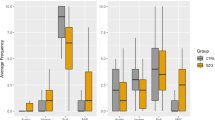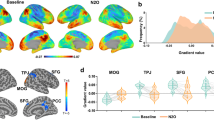Abstract
THAT a diminution in the oxygen tension of the inspired air can produce mental changes is an established fact. Far less certain is the possible correlation between psychotic manifestations as seen in clinical practice and an impoverished supply of oxygen to the central nervous system. It was thought that further light might be shed on this possibility by estimating the gaseous content of arterial blood and also of that drawn from the internal jugular vein of the same subject. In a group of patients in which the diagnosis of schizophrenia appears certain, this procedure has been carried out according to the method used by Lennox1, and the following results were obtained:
This is a preview of subscription content, access via your institution
Access options
Subscribe to this journal
Receive 51 print issues and online access
$199.00 per year
only $3.90 per issue
Buy this article
- Purchase on Springer Link
- Instant access to full article PDF
Prices may be subject to local taxes which are calculated during checkout
Similar content being viewed by others
References
Lennox, Arch. Neurol. and Psychiat., 26, 719 (1931).
Author information
Authors and Affiliations
Rights and permissions
About this article
Cite this article
THOMPSON, J., CORWIN, W. & ASTE-SALAZAR, J. Physiological Patterns and Mental Disturbances. Nature 140, 1062–1063 (1937). https://doi.org/10.1038/1401062a0
Issue Date:
DOI: https://doi.org/10.1038/1401062a0
Comments
By submitting a comment you agree to abide by our Terms and Community Guidelines. If you find something abusive or that does not comply with our terms or guidelines please flag it as inappropriate.



